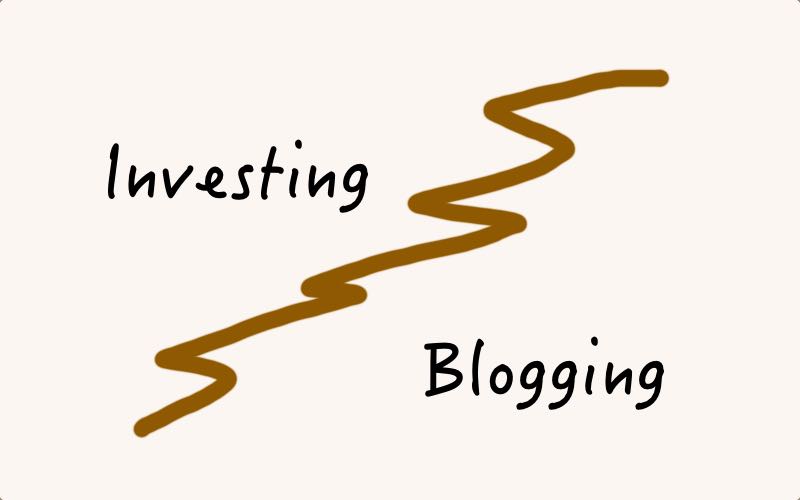Blogging and investing are two very different subjects but they actually have more in common than one might think.
Exactly one year ago, I published my first blog post on this site. Ever since then I’ve been consistently publishing once a week.
It’s safe to say that I must enjoy what I’m doing or else I won’t last this long!
And while I enjoy writing both financial and occasionally blogging subjects, I noticed that these two contrasting themes have striking similarities.
In fact, it’s through these similarities that kept me from giving up!
If you’re passionate about blogging, then here are some of the investing principals you can apply to keep you motivated…

This post may contain affiliate links, which means I may receive a commission, at no extra cost to you, if you make a purchase through a link. Please see my full disclosure for further information.
5 Investing Principals That Also Apply to Blogging
1. Blogging and Investing Are Long-Term Games
Blogging is fun but it can also get quite extraneous. If you lose focus, you might put your hands up and quit.
Just like investing, there will be lots of ups and downs. This volatility doesn’t matter much in the short-term but matters a whole lot in the long-run.
For example, every investor must have experienced those sudden drop in value in the beginning of his/her investment journey.
These drops can be disheartening especially knowing how much work you’ve put forth to make that investment.
However, if you can stay the course despite experiencing dips, you might find that your investment can produce fruitful results later on.
This is similar to starting a blog. In the beginning phase, traffic is very slow and just when you saw that it picks up a bit, it comes right back down.
And if you look at the traffic results long enough, you might get discouraged and pull out!
It’s important to not look at the day-to-day fluctuation of online traffic because the short-term result simply doesn’t matter. What matters is keep producing quality contents so that your website can grow organically.
This is the same principle as with an investment. What matters most is to keep on investing and stay away from the day-to-day fluctuation of the market.
2. Risk-Taking
Risk-taking is inevitable when it comes to investing. No matter how confident you feel about an investment, there is no guarantee of return.
Similarly, you might have found a brilliant topic for your blog that you think will be a hit. But the truth is that you take risk by putting in your time, money and effort in hopes that your blog will take off.
Granted, blogging is definitely way less daunting than investing because if the blog doesn’t work out, at least you created something. But with an investment, you can seriously risk losing it all.
What I found that helps to minimize risk is to do research because the more you know, the more you become confident about your decisions.
With investing, it’s important to stay on top of macro and micro-economic events as well as look into the company’s annual earnings.
On the other hand, it’s also important to stay current with knowledge on blogging such as staying up to date with analytics and social media changes.
At the end, both investing and blogging are worth endeavors worth taking the risk. You just never know where your investment might take you down the road.
3. Realm of Specialty
Another way to manage risk is to invest in what you know. This is the same principle for blogging as it is for investing.
Certainly, you can invest in just about anything without a deep knowledge but it might cost you in the long-run.
Similarly, if you blog about just anything, you might not be niche enough to draw in an audience.
Furthermore, if you venture outside of your realm of specialty, you might even run out of ideas to write about. That’s why it’s important to pick something you have knowledge of and enjoy blogging about.
And just like investing, it’s clear that staying focus on a knowledge area is the best way to grow an investment.
4. Return On Investment
Return on investment or ROI is a measurement of the amount of return that an investment generates. Simply put, it measures how much you can make from an investment comparing to others.
If you treat blogging as a business to generate some type of return, you’ll want to measure that return against that of an alternative.
For example, instead of blogging, what if you dedicate your time and effort in vlogging or opening an Amazon shop instead?
Unfortunately, unlike a typical investment where the return can be calculated by the yield, blogging simply does not have that info.
Therefore, you might find a wide spectrum of advice on the internet varying from those who earn over $1 million a year vs. those who earn a few bucks.
However, one thing for certain is that when it comes to investing and blogging, everyone expects a positive ROI.
Even though you may not get the return you’re looking for in blogging, you can also quantify the return in an intrinsic way such as whether or not a blog provides personal value beyond the dollar sign.
Sometimes, blogging can open up other doors of opportunities that could out-weight the real ROI. These opportunities may include developing relationship with an audience, other bloggers and the media as well as new knowledge to build another business.
5. Both Blogging and Investing Are Challenging Endeavors
Finally, both blogging and investing are challenging in its own right.
When you spend your time, effort and money into building a blog, you naturally want to do your best to make it grow.
This could be a very challenging endeavor as you’re setting yourself up against the odds of failing.
Similarly, when it comes to investing, you’re also faced with the challenge of losing your investment altogether.
It may seem logical at the beginning of an investment or blogging journey to develop a long-term vision, take risk, and stay within one’s realm of specialty in hopes of generating a positive ROI. However, the reality is much more difficult in practice than in theory.
For example, when an investment goes down in value, your immediate response might be to get out of the market to cut losses. Similarly, you may want to give up your blog when you see that it’s not going anywhere.
But this is where the challenge requires you to stay the course as the beginning journey is the toughest to overcome.
As with investing, it sometimes take that one major turning point for a blog to take off. This turning point may seem far-fetched at times, but it’ll happen to just about anyone who stays persistent.
This is the same with an investment. The beginning is slow moving and you might even want to pull out of your investment especially during a downturn.
But if you can overcome the emotional challenge of the ups and downs that come with blogging and investing, you might find that the end game is closer than you think!
Related: A list of blogging tools to build a powerful blog

PIN it


